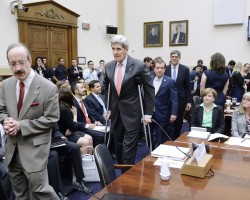
POLICY BRIEF: Living with the Consequences
Living with the Consequences: The Effects of Voting Down the Iran Nuclear Agreement
Policy Brief by J. Dana Stuster
July 28,
2015
Should Congress vote down the nuclear agreement with Iran, it will inhibit the
ability of the United States to implement an effective foreign policy for the
foreseeable future. Rejecting the deal will alienate U.S. allies and diminish
U.S. standing in future negotiations. It will isolate the United States both
diplomatically and economically, as the sanctions regime collapses and rivals
set up a new financial infrastructure that will undermine the effectiveness of
U.S. sanctions. It will empower the hardliners in Iran that drive the worst
elements of Iran’s regional policies, escalating conflict in Iraq and Syria, and
encourage them to rush for the nuclear weapon that the Joint Comprehensive Plan
of Action is designed to prevent. And it will do this while leaving Iran’s
nuclear program unconstrained and our leverage diminished, making a military
strike on Iran’s nuclear facilities – and a series of low-intensity reprisals –
almost certainly inevitable.
These are just the foreseeable consequences – to say nothing of unanticipated
second- and third-order effects. And even if not all of these effects occur,
each that does makes the next significantly worse – and the United States less
able to mitigate the harm to its foreign policy. The consequence of rejecting
the nuclear agreement is more than the sum of its parts: It is a catastrophe.
Read the full NSN Policy Brief.
Check out the helpful infographic we made here.
In the News
- NSN Policy Brief in Foreign Policy’s Situation Report, 7/29/15





